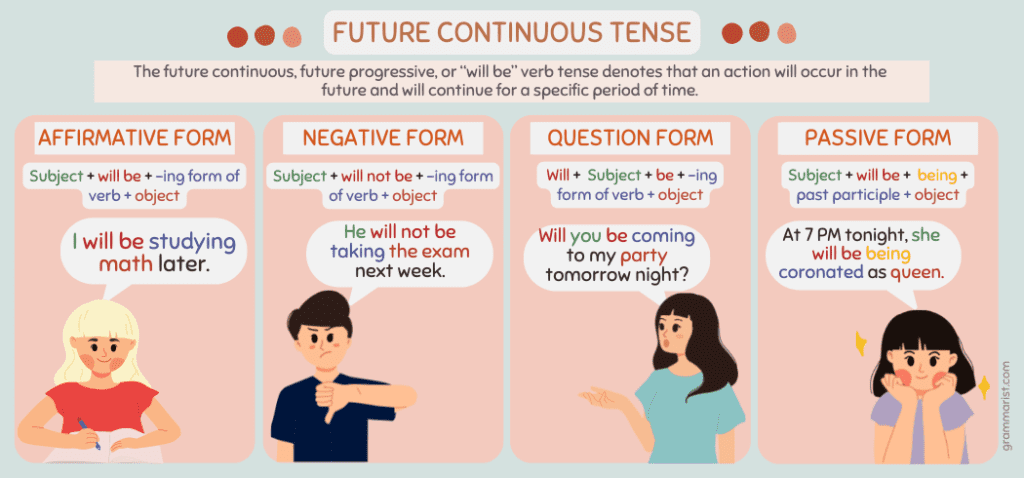The future continuous tense not only shows when a future action will occur or be completed. This verb tense also indicates that the future action will continue for a specific period.
I’ll go over the future continuous forms and uses with sentence examples, so follow along! I also included a worksheet that will test your understanding of the verb tense. Let’s get started!
What is the Future Continuous Tense?

The future continuous, future progressive, or “will be” verb tense denotes that an action will occur in the future and will continue for a specific period of time.
Basically, it just means the sentence should describe the future event and its continuity or progression. Simple, right?
It is different from the simple future tense since the actions here only indicate when they will happen and be completed. You can use the simple future tense with or without an exact time, too.
For example, if I said the statement, “you will watch the new episode at four o’clock tomorrow,” the simple future form only uses “will” + the base form of the verb. Unlike the future continuous tense, this sentence shows that you will watch the episode in an instant, all at once.
But if I say, “you will be watching the new episode at four o’clock tomorrow,” it means that the action of watching will be progressive.
What is the Formula of Future Continuous Tense?
I know several ways to form the future continuous verb tense. The main idea is to use “will be” and the -ing form of the verb as a verb phrase. “Will” is a modal verb that is always followed by its bare infinitive form without to.
In affirmative future forms or positive sentences, the continuous tense formula is:
- Subject + will be + -ing form of the verb + object.
In negative sentences, we use “not” in the helping verb or auxiliary verb to make it “will not be.” Here is the complete formula for the complete sentence:
- Subject + will not be + -ing form of the verb + object.
The common short form of “will not” is “won’t.” So you can say, “won’t be” plus the present participle form of the verb.
For the interrogative form or question sentences, we use the formula below.
- Will + subject + be + -ing form of the verb + object.
Passive forms of the future continuous tense are also essential. The construction is as follows:
- Subject + will be + being + past participle + object.
Remember that we only use the future continuous tense with lexical or action verbs. Specific non-continuous meanings for mixed verbs are not allowed in the progressive form. We can’t use them for stative verbs or verbs that describe existence.
In some instances, we can use nonstative verbs depending on the context. For example, “I will be happy next week if you visit” is in the future tense. It does not use the present participle of verb or any actionable verb.
Why Do We Use Future Continuous Tense?

Remember that we use the future continuous tense to specify an event happening during an exact future time range, discuss multiple future actions, or when a future situation interrupts another. I went ahead and put together the rules for using the future continuous tense.
To Describe a Future Action Happening During a Specific Time
The primary purpose of the future continuous tense is to discuss a continuous action or ongoing action in the future at a specific time. For example:
- I will be leaving the house from 8 PM to 3 AM.
To Describe Multiple Future Actions Happening at the Same Time
We can use this verb tense to discuss multiple continuous events that will happen in the future. These can be predictions or actual events that will occur. Consider the sentence examples below.
- Shane will be watching the game tomorrow while I’m at work.
- Julia and the class will be going to the zoo next month, and Jenelle’s team will be at the park.
To Describe a Future Action Interrupted by Another Action
Use the future continuous tense to show the interruption in time of a future action by a shorter action.
The interruption should be in the simple present tense, while the interrupting event is in the future progressive tense. That’s because time clauses express interruption, and it’s impossible to use simple future tenses in time clauses. For example:
- I will be making repairs tomorrow night when the tools arrive.
- She will be going to the beach tomorrow once the sun rises.
To Describe Likely Hypothetical Situations in the Future
Aside from discussing an unfinished action, the future continuous tense can also show predictions or guesses about future events. For example:
- I expect that the online shop will be sending an email newsletter once the clock strikes 12.
Time Expressions Used with Future Continuous
Here are some time markers you can use for this verb tense.
- Next week/month/year.
- in/on/at.
- later/this afternoon/tonight/tomorrow/soon.
The placement for grammar adverbs can be before or after the verb.
Examples of Sentences Using Future Continuous Tense
Below is a list of more future continuous tense examples in sentences.
- I will not be discussing with angry parents tomorrow if I receive any negative emails today.
- The dog might be sad tomorrow when you leave for school.
- She will be watching the match at 2 PM.
- This type of leaf will not be drying when autumn arrives.
- Tomorrow morning when you wake up, your sister will be leaving for work.
- Will you be hiding in a bunker if the apocalypse happens?
- I am going to be working while he takes care of the kids at home.
- On Kyla’s birthday, we will be having a costume party, meeting new people, and dancing to music.
Use the Future Continuous Tense Properly
Mastering the different verb tenses is crucial to achieving perfect grammar in English. I hope this grammar guide helped you understand the meaning, uses, and forms of the future continuous tense.
Use the “will be” + -ing form of the verb when constructing sentences that:
- Describe a future action happening during a specific time.
- Show multiple future actions.
- Indicate a future action interrupted by another action.
- Make predictions or hypothetical events.